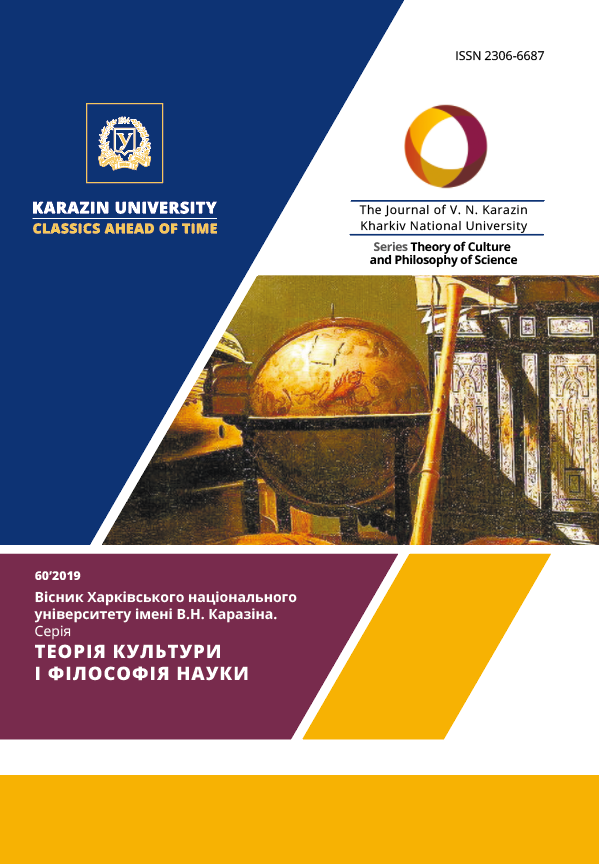Integral rationalism
ontological and epistemological intentions in context of the european rationalism development
Abstract
The article is sanctified to consideration of the modern stateof conception of integral r ationalism, that originates theideological sources from the paradigm of Europe adogmatism. An author distinguishes her ontological andepistemological intensions that direc tly touch themodern mainstream of Interdisciplinary and thinking in complication. Postmetaphysical tendencies areexposed to the walkthrough in philo sophy, science, andreligions that gravitate to rapprochement as a generalmental structure of i ntegral rationalism of new Logos.The world view factors of the European thinking, that entail edthe crisis phenomena in the coexistence of countries ofEuropean Union, are studied, on the basis of adogmatic reflection of historical preconditions of European integration.
The present day is the post-metephysical period of awareness of the need for a return to holistic thinking, the focus of which at present is synergetic. Science, remaining "a high-tech knowledge center", paves the way through interdisciplinarity and transdisciplinarity to the transversal mind, which is still an imaginary horizon of ontological unity of various types of rationality and the definition of reason as such.
In theology, there is an acute reformist need for the creation of a "new intellectual non-church religion", which would first of all honor ethical and aesthetic functions that produce the moral safeguards of human life. Each aspect of integral rationalism is in a state of intrinsic imbalance, which is capable of showing the intentions of convergence (or dispersal in the event of deepening of the crisis trends) to each other through a sinergetic antagonism around the idea of the "faith is the entelechy of mind" integral rationalism.
Such intentions arise primarily through the awakening of an ontological inquiry into the metaphysical unity of being and being in their hermeneutic circle. The world, immersed in a pathos train (stable perseverance) of globalization with the intention to change the existence in space measurements, made a fatal mistake, not taking into account that such a change is heavy for itself and the change of things, namely, human-being. The expectation that a person under the influence of technological pressure (since it was he who became the driving factor for global development) automatically turned into a "citizen of the world" did not materialize: the regionality of thinking, the location of traditions, nationalism, religious isoletionism, the existence of "poles of influence" on geopolitics and therefore the existence (human) among the technical revolutions is in the forgotten frontier of "globalization-anti- globalism".
Downloads
References
Філософське та науково-методологічне дослідження теоретичних засад прийняття оптимальних рішень персоналом структур та підрозділів залізничного транспорту в умовах значного зростання інтенсивності руху поїздів. – Звіт про НДР. – УкрДУЗТ, 2009. – 221с.
Філософське та науково-практичне дослідження конструктивних мож ливостей інтегрального раціоналізму для створення сучасних та над сучасних когнітивних технологій забезпечення прийняття рішень персоналом структур та підрозділів залізничного транспорту в умовах значного зростання інтенсивності руху поїздів. – Звіт про НДР. – УкрДУЗТ, 2017. – 56с.
Петрушов В.М. Питання часу: буттєва розгубленість чи онтологічні очікування? //Вісник Харківського національного педагогічного університету ім. Г.С. Сковороди. "Філософія", вип. 50- Харків, ХНПУ, 2018, с.23-35.
Бультман Р. Избранное: Вера и понимние. Том I-II [Електронний ресурс] / Р. Бультман – Режим доступу: https://www.livelib.ru/book/1000091358/about- izbrannoe-vera-i-ponimanie-rudolf-bultman .- Назва з екрана.
Башляр Г. Избранное. Том 1. Научный рационализм. М; СПб.: Университетская книга, 2000. 395 с.
Моисеев В.И. Логика всеединства [Електронний ресурс] / В.И. Моисеев – Режим доступу: http://vyacheslav-moiseev.narod.ru/LogVs/LOGVS.pdf . Назва з екрана.
Хайдеггер М. Время и бытие: Статьи и выступления. – Спб.: Наука, 2007. – С. 332.
Іbid. С.58-59.
Вельш В. Жиль Делез или гетерогенность и соединение / Проблема раціональності наприкінці ХХ століття. Матеріали V Харківських міжнародних Сковородинівських читань. – Харків, Ун-т внутр.справ, 1998.- С.102-112.
Корредойра Мартин Л. Сумерки эпохи науки [Електронний ресурс] / Мартин Л. Корредойра – Режим доступу: https://arxiv.org/abs/1305.4144 . - Назва з екрана.
Курдюмов С.П., Малинецкий Г.Г. Синергетика – теория самоорганизации / Компьютеры, модели, эксперимент. – М.: Наука, - 1988. – С. 98-99.
Майнцер К. Сложносистемное мышление: Материя, разум, человечество.
Новый синтез. - М.: Книжный дом «ЛИБРОКОМ», 2009. - 464 с.
Мануэль Кастельс. Информационная эпоха: экономика, общество культура. Информационно-технологическая парадигма [Електронний ресурс] /Кастельс Мануаль – Режим доступу: http://polbu.ru/kastels_informepoch/ch15_all.html. Назва з екрана.
Михаил Куртов. Генезис графического пользовательского интерфейса. К теологии кода. СПб.: ТрансЛит, 2014. — 88 с
Хайдеггер М. Время и бытие: Статьи и выступления. – Спб.: Наука, 2007. – С. 318.
Ibid. C. 358.
Ibid. C. 329.
Дружинин В.В., Конторов Д.С., Конторов М.Д. Введение в теорию конфликта. – М.: Радио и связь, 1989. – 288с.
Винер Н. Кибернетика, или управление и связь в животном и машине. – М.: Наука, 1983. С.94.
Загряжский Б.А. «Мнимая величина» / Будущее искусственного интеллекта. – М.: Наука, 1991. – С.179.
Хокинг С. Краткая история времени [Електронний ресурс] / Стивен Хокинг – Режим доступу: https://www.litmir.me/br/?b=242723&p=1 . Назва
з екрана.
Степанянц М.Т. От европоцентризма к межкультурной философии // Вопросы философии, №10.- 2015.- С.150-162.
Розин В.М. Методология познания и конституирование реальности в междисциплинарных исследоваиях // EPISTEMOLOGY & PHILOSOPHY OF, 2016 , Т. XLVIII. - № 2.- С.141-150.
Польсков К.О. Верификация и теология // Вопросы философии, №8. – 2018. - С.130-145.
Боритесь за Европу – или вредители уничтожат ее. Идея Европы в опасности. [Електронний ресурс] – Режим доступу:
https://www.apn.ru/index.php?newsid=37697 . Назва з екрана.
Хайдеггер М. Время и бытие: Статьи и выступления. – Спб.: Наука, 2007. – С.264.
Ibid. C.288.
Ibid. C.287.
Гуссерль Э. Кризис европейских наук и трансцендентальная феноменология // Вопросы философии, №7. – 1992. – С.142.
Кнабе Г.С. Понятие энтелехии и история культуры // Вопросы философии, №5. – 1993. – С.66.
Бернар-Анрі Л. Битва за Європу. Інтерв’ю журналу «Новое время». [ Електронний ресурс] – Режим доступу: https://nv.ua/ukr/world/geopolitics/ce-bitva-za-yevropu-vidomiy- filosof-pro-shansi-yes-vistoyati-proti-populistiv-50007624.html




